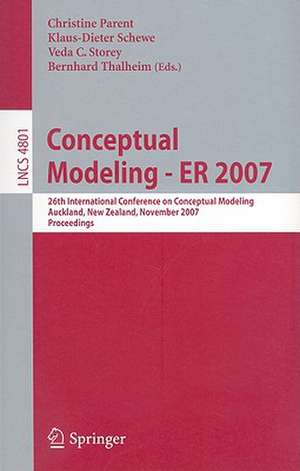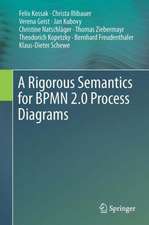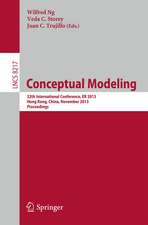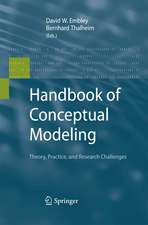Conceptual Modeling - ER 2007: 26th International Conference on Conceptual Modeling, Auckland, New Zealand, November 5-9, 2007, Proceedings: Lecture Notes in Computer Science, cartea 4801
Editat de Christine Parent, Klaus-Dieter Schewe, Veda C. Storey, Bernhard Thalheimen Limba Engleză Paperback – 15 oct 2007
Din seria Lecture Notes in Computer Science
- 20%
 Preț: 1061.55 lei
Preț: 1061.55 lei - 20%
 Preț: 307.71 lei
Preț: 307.71 lei - 20%
 Preț: 438.69 lei
Preț: 438.69 lei - 20%
 Preț: 579.30 lei
Preț: 579.30 lei -
 Preț: 410.88 lei
Preț: 410.88 lei - 17%
 Preț: 427.22 lei
Preț: 427.22 lei - 20%
 Preț: 596.46 lei
Preț: 596.46 lei - 15%
 Preț: 448.04 lei
Preț: 448.04 lei - 20%
 Preț: 353.50 lei
Preț: 353.50 lei -
 Preț: 389.49 lei
Preț: 389.49 lei - 20%
 Preț: 309.90 lei
Preț: 309.90 lei - 20%
 Preț: 645.28 lei
Preț: 645.28 lei - 20%
 Preț: 763.23 lei
Preț: 763.23 lei - 15%
 Preț: 580.46 lei
Preț: 580.46 lei - 20%
 Preț: 310.28 lei
Preț: 310.28 lei - 20%
 Preț: 655.02 lei
Preț: 655.02 lei - 20%
 Preț: 1183.14 lei
Preț: 1183.14 lei - 20%
 Preț: 340.32 lei
Preț: 340.32 lei -
 Preț: 449.57 lei
Preț: 449.57 lei - 20%
 Preț: 591.51 lei
Preț: 591.51 lei - 18%
 Preț: 938.83 lei
Preț: 938.83 lei - 20%
 Preț: 337.00 lei
Preț: 337.00 lei - 20%
 Preț: 649.50 lei
Preț: 649.50 lei - 20%
 Preț: 607.40 lei
Preț: 607.40 lei - 20%
 Preț: 1414.79 lei
Preț: 1414.79 lei - 20%
 Preț: 1024.44 lei
Preț: 1024.44 lei - 20%
 Preț: 583.40 lei
Preț: 583.40 lei - 20%
 Preț: 453.32 lei
Preț: 453.32 lei - 20%
 Preț: 575.49 lei
Preț: 575.49 lei - 20%
 Preț: 1075.26 lei
Preț: 1075.26 lei - 20%
 Preț: 585.88 lei
Preț: 585.88 lei - 20%
 Preț: 825.93 lei
Preț: 825.93 lei - 17%
 Preț: 360.20 lei
Preț: 360.20 lei - 20%
 Preț: 763.23 lei
Preț: 763.23 lei - 20%
 Preț: 340.32 lei
Preț: 340.32 lei - 20%
 Preț: 504.58 lei
Preț: 504.58 lei - 20%
 Preț: 369.13 lei
Preț: 369.13 lei - 20%
 Preț: 580.93 lei
Preț: 580.93 lei - 20%
 Preț: 343.62 lei
Preț: 343.62 lei - 20%
 Preț: 350.21 lei
Preț: 350.21 lei - 20%
 Preț: 583.40 lei
Preț: 583.40 lei - 20%
 Preț: 583.40 lei
Preț: 583.40 lei - 15%
 Preț: 438.59 lei
Preț: 438.59 lei - 20%
 Preț: 341.95 lei
Preț: 341.95 lei - 20%
 Preț: 238.01 lei
Preț: 238.01 lei - 20%
 Preț: 538.30 lei
Preț: 538.30 lei
Preț: 661.65 lei
Preț vechi: 827.05 lei
-20% Nou
Puncte Express: 992
Preț estimativ în valută:
126.61€ • 135.39$ • 105.56£
126.61€ • 135.39$ • 105.56£
Carte tipărită la comandă
Livrare economică 17 aprilie-01 mai
Preluare comenzi: 021 569.72.76
Specificații
ISBN-13: 9783540755623
ISBN-10: 3540755624
Pagini: 638
Ilustrații: XVI, 616 p.
Dimensiuni: 155 x 235 x 24 mm
Greutate: 0.86 kg
Ediția:2007
Editura: Springer Berlin, Heidelberg
Colecția Springer
Seriile Lecture Notes in Computer Science, Information Systems and Applications, incl. Internet/Web, and HCI
Locul publicării:Berlin, Heidelberg, Germany
ISBN-10: 3540755624
Pagini: 638
Ilustrații: XVI, 616 p.
Dimensiuni: 155 x 235 x 24 mm
Greutate: 0.86 kg
Ediția:2007
Editura: Springer Berlin, Heidelberg
Colecția Springer
Seriile Lecture Notes in Computer Science, Information Systems and Applications, incl. Internet/Web, and HCI
Locul publicării:Berlin, Heidelberg, Germany
Public țintă
ResearchCuprins
Keynotes.- Modeling Workflow Patterns from First Principles.- Heart Modeling, Computational Physiology and the IUPS Physiome Project.- Conceptual Schemas and Ontologies for Database Access: Myths and Challenges.- Data Warehousing and Data Mining.- Multidimensional Data Modeling for Business Process Analysis.- Mining Hesitation Information by Vague Association Rules.- A Model Driven Modernization Approach for Automatically Deriving Multidimensional Models in Data Warehouses.- Design Methodologies and Tools.- Cost-Based Fragmentation for Distributed Complex Value Databases.- From Business Models to Service-Oriented Design: A Reference Catalog Approach.- Teaching a Schema Translator to Produce O/R Views.- Building a Tool for Cost-Based Design of Object-Oriented Database Schemas.- Information and Database Integration.- Generic Schema Mappings.- Relational Data Tailoring Through View Composition.- On the Discovery of Preferred Work Practice Through Business Process Variants.- Information Modelling Concepts and Ontologies.- Towards Automated Reasoning on ORM Schemes.- From Declarative to Imperative UML/OCL Operation Specifications.- An Ontological Metamodel of Classifiers and Its Application to Conceptual Modelling and Database Design.- Integrity Constraints.- Handling Inconsistency of Vague Relations with Functional Dependencies.- Querying Incomplete Data with Logic Programs: ER Strikes Back.- Prioritized Preferences and Choice Constraints.- Logical Foundations of Conceptual Modelling.- Reasoning over Extended ER Models.- On Order Dependencies for the Semantic Web.- Collection Type Constructors in Entity-Relationship Modeling.- Patterns and Conceptual Meta-modelling.- Schema Exchange: A Template-Based Approach to Data and Metadata Translation.- A Conceptual Modeling Methodology Based on Niches and Granularity.- As We May Link: A General Metamodel for Hypermedia Systems.- Requirements Elicitation.- A Goal Oriented Approach for Modeling and Analyzing Security Trade-Offs.- Rapid Business Process Discovery (R-BPD).- Ontology-Driven Business Modelling: Improving the Conceptual Representation of the REA Ontology.- A Comparison of Two Approaches to Safety Analysis Based on Use Cases.- Using Unified Modeling Language for Conceptual Modelling of Knowledge-Based Systems.- Tracing the Rationale Behind UML Model Change Through Argumentation.- Reuse and Reengineering.- Exploring Alternatives for Representing and Accessing Design Knowledge About Enterprise Integration.- Mining and Re-engineering Transactional Workflows for Reliable Executions.- Cross: An OWL Wrapper for Reasoning on Relational Databases.- Semi-structured Data and XML.- Augmenting Traditional Conceptual Models to Accommodate XML Structural Constructs.- VERT: A Semantic Approach for Content Search and Content Extraction in XML Query Processing.- A Conceptual Model for Multidimensional Analysis of Documents.- Web Information Systems and XML.- Automatic Hidden-Web Table Interpretation by Sibling Page Comparison.- A Fine-Grained XML Structural Comparison Approach.- Fine-Grained Compatibility and Replaceability Analysis of Timed Web Service Protocols.





















